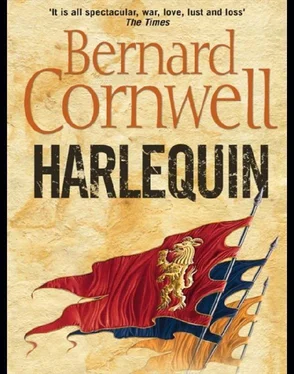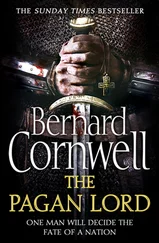Maybe," Thomas allowed.
They will win,“ Jeanette insisted. I listen to the conversations, Thomas! They are too many.”
Thomas made the sign of the cross. If Jeanette was right, and he had no reason to think she was deceiving him, then the army's leaders had already given up hope, but that did not mean he had to despair. They have to beat us first,“ he said stubbornly. They will,” Jeanette said brutally, and what happens to me then?"
What happens to you?“ Thomas asked in surprise. He leaned cautiously against the fragile wall of his shelter. He sensed that Eleanor had already delivered the food and hurried back to eavesdrop. Why should I care,” he asked loudly, what happens to you?"
Jeanette shot him a vicious look. You once swore to me," she said, that you would help restore my son to me.
Thomas made the sign of the cross again. I did, my lady," he admitted, reflecting that he made his oaths too easily. One oath was enough for a lifetime and he had made more then he could recall or keep.
Then help me do that," Jeanette demanded.
Thomas smiled. There's a battle to be won first, my lady.“ Jeanette scowled at the smoke that churned in the small shelter. If I am found in the English camp after the battle, Thomas, then I will never see Charles again. Never.”
Why not?“ Thomas demanded. It's not as if you'll be in danger, my lady. You're not a common woman. There might not be much chivalry when armies meet, but it just about reaches into the tents of royalty.”
Jeanette shook her head impatiently. If the English win,“ she said, then I might see Charles again because the Duke will want to curry favour with the King. But if they lose, then he will have no need to make any gesture. And if they lose, Thomas, then I lose everything.” That, Thomas reckoned, was closer to the nub. If the English lost then Jeanette risked losing whatever wealth she had accumulated in the last weeks, wealth that came from the gifts of a prince. He could see a necklace of what looked like rubjes half hidden by her swathing cloak, and doubtless she had dozens of other precious stones set in gold.
So what do you want of me?" he asked.
She leaned forward and lowered her voice. You,“ she said, and a handful of men. Take me south. I can hire a ship at Le Crotoy and sail to Brittany. I have money now. I can pay my debts in La Roche-Derrien and I can deal with that evil lawyer. No one need know I was even here.”
The Prince will know," Thomas said.
She bridled at that. You think he will want me for ever?“ What do I know of him?”
He will tire of me,“ Jeanette said. He's a prince. He takes what he wants and when he is tired of it he moves on. But he has been good to me, so I cannot complain.”
Thomas said nothing for a while. She had not been this hard, he reflected, in those lazy summer days when they had lived as vagabonds. And your son?“ he asked. How will you get him back? Pay for him?”
I will find a way," she said evasively.
Probably, Thomas thought, she would try to kidnap the boy, and why not? If she could raise some men then it would be possible. Maybe she would expect Thomas himself to do it and as that thought occurred to him so Jeanette looked into his eyes. Help me,“ she said, please.”
No,“ Thomas said, not now.” He held up a hand to ward off her protests. One day, God willing,“ he went on, I'll help find your son, but I'll not leave this army now. If there's to be a battle, my lady, then I'm in it with the rest.”
I am begging you," she said.
No."
Then damn you," she spat, pulled the hood over her black hair and went out into the darkness. There was a short pause, then Eleanor came through the entrance.
So what did you think?" Thomas asked.
I think she is pretty,“ Eleanor said evasively, then she frowned at him, and I think that in battle tomorrow a man could seize you by the hair. I think you should cut it.”
Thomas seemed to flinch. You want to go south? Escape battle?“ Eleanor gave him a reproachful look. I am an archer's woman,” she said, and you will not go south. Will says you are a goddamn fool,“ she said the last two words in clumsy English, to give up such good food, but thanks you anyway. And Father Hobbe tells you that he is saying Mass tomorrow morning and expects you to be there.”
Thomas drew his knife and gave it to her, then bent his head. She sawed at his pigtail, then at handfuls of black hair that she tossed onto the fire. Thomas said nothing as she cut, but just thought about Father Hobbe's Mass. A Mass for the dead, he thought, or for those about to die.
For in the wet dark, beyond the forest, the might of France was drawing close. The English had escaped the enemy twice, crossing rivers that were supposed to be impassable, but they could not escape a third time. The French had caught them at last. The village lay only a short walk north of the forest's edge from which it was separated by a small river that twisted through placid water meadows. The village was an unremarkable place: a duck-pond, a small church and a score of cottages with thick thatched roofs, small gardens and high dungheaps. The village, like the forest, was called Crecy.
The fields north of the village rose to a long hill that ran north and south. A country road, rutted by farm carts, ran along the hill's crest, going from Crecy to another village, just as unremarkable, called Wadicourt. If an army had marched from Abbeville and skirted the Forest of Crecy it would come westwards in search of the English and, after a while, they would see the hill between Crecy and Wadicourt rearing in front of them. They would see the stump-like church towers in the two small villages, and between the villages, but much closer to Crecy and high on the ridge top where its sails could catch the winds, a mill. The slope facing the French was long and smooth, untroubled by hedge or ditch, a play-ground for knights on horseback. The army was woken before dawn. It was a Saturday, 26 August, and men grumbled at the unseasonable chill. Fires were stirred to life, reflecting flame light from the waiting mail and plate armour. The village of Cre'cy had been occupied by the King and his great lords, some of whom had slept in the church, and those men were still arming themselves when a chaplain of the royal household came to say a Mass. Candles were lit, a handbell sounded and the priest, ignoring the clank of armour that filled the small nave, called on the help of Saint Zephyrinus, Saint Gelasinus and both the saints called
Genesius, all of whom had their feasts on this day, and the priest also sought aid from Little Sir Hugh of Lincoln, a child who had been murdered by the Jews on this same day nearly two hundred years before. The boy, who was said to have shown a remarkable piety, had been found dead, and no one understood how God could have allowed such a paragon to be snatched from earth so young, but there were Jews in Lincoln and their presence had provided a convenient answer. The priest prayed to them all. Saint Zephyrinus, he prayed, give us victory. Saint Gelasinus, he pleaded, be with our men. Saint Genesius, look after us, and Saint Genesius, give us strength. Little Sir Hugh, he begged, thou child in God's arms, intercede for us. Dear God, he prayed, in Thy great mercy, spare us. The knights came to the altar in their linen shirts to receive the Sacraments. In the forest the archers knelt to other priests. They made con-fession and took the dry, stale bread that was the body of Christ. They made the sign of the cross. No one knew there was to be a battle that day, but they sensed the campaign had come to its end and they must either fight today or the next. Give us enough arrows, the archers prayed, and we shall make the earth red, and they held their yew staves towards the priests who touched the bows and said prayers over them.
Читать дальше
Конец ознакомительного отрывка
Купить книгу












